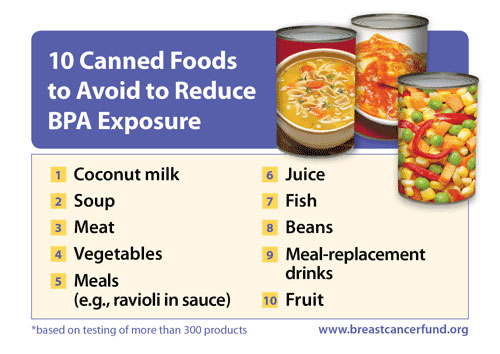 By Lindsay Dahl
By Lindsay Dahl
We know the best solution for addressing toxic chemicals is for Congress to pass the Safe Chemicals Act, but in the meantime here are some tips to protect your family from toxic chemicals in food and packaging.
TIPS TO AVOID TOXIC CHEMICALS IN FOOD:
1) Limit canned food and plastic containers.
Glass, stainless steel and lead- free
ceramic are great alternatives to storing food in plastic containers. Canned
food is one of our largest exposures to the toxic chemical BPA. But a study conducted by the Breast Cancer Fund and the Silent Spring Institute found that families
can reduce their BPA levels by 60% in just three days by avoiding food
packaging with BPA. Download the top ten canned foods to avoid wallet
card.
2) Avoid non-stick pans.
They may seem convenient, but be wary of
non-stick pans. Most non-stick cookware is made using PFOA – a toxic
chemical linked to cancer and other health issues. Choose stainless steel, cast
iron or enameled pots and pans instead.
3) Popcorn the old fashioned way.
Most microwave popcorn bags are lined with
toxic perfluorooctanoic acid (PFOA). This possible carcinogen shows up in
french fry cups and pizza boxes as well. Try popcorn on the stove, or easy microwave
technique using a brown paper bag
 4) Filter your drinking water.
4) Filter your drinking water.
Remove common contaminants like arsenic and
lead from your drinking water by filtering with either a faucet unit or a water
pitcher. Avoid buying plastic
bottled water; instead, fill up a stainless steel water bottle with
filtered water.
5) Buy organic when possible.
Check out the “dirty dozen” list before you head to
the grocery store. And remember organic doesn’t always have to be more
expensive than pesticide-laden foods. Many farmers markets and community
supported agriculture programs have cost competitive, healthy produce.
6) Avoid food dyes.
Many foods on the market contain food dyes, 90% of which are derived from petroleum. Some studies show food dyes are linked to hyperactivity and other disturbed behavior in children. Use this searchable database to find which synthetic dyes are used in your favorite foods. For more information on food dyes download this factsheet here.
7) Tell Congress to fix our broken laws.
Enough with this nonsense! Consumers
shouldn’t have to bear the burden of avoiding toxic chemicals. We need Congress
to get tough on toxic chemicals. Contact
Congress today to tell them to update our laws on toxic chemicals. And then ask Congres to ban BPA in food packaging here.
For more tips on how to protect your family from toxic
chemicals, check out our popular “tips”
blog.
Follow Lindsay on Twitter: @Lindsay_SCHF @SaferChemicals



